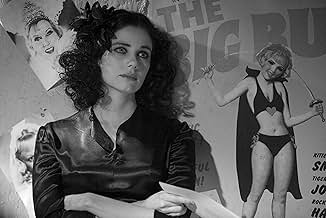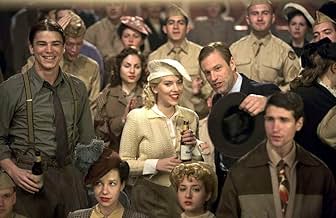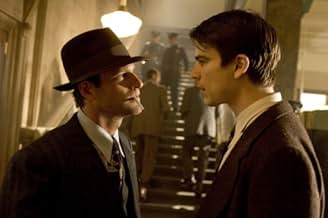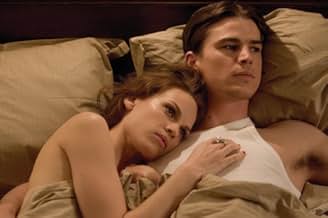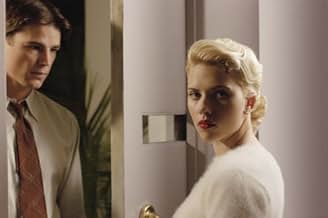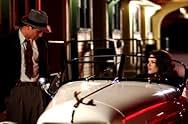IMDb-BEWERTUNG
5,6/10
78.694
IHRE BEWERTUNG
Zwei Polizisten sehen, wie ihr Privat- und Berufsleben nach den Ermittlungen wegen Ermittlungen im Mordfall "Black Dahlia" auseinander fällt.Zwei Polizisten sehen, wie ihr Privat- und Berufsleben nach den Ermittlungen wegen Ermittlungen im Mordfall "Black Dahlia" auseinander fällt.Zwei Polizisten sehen, wie ihr Privat- und Berufsleben nach den Ermittlungen wegen Ermittlungen im Mordfall "Black Dahlia" auseinander fällt.
- Regie
- Drehbuch
- Hauptbesetzung
- Für 1 Oscar nominiert
- 4 Gewinne & 16 Nominierungen insgesamt
Angus MacInnes
- Capt. John Tierney
- (as Angus MacInnis)
Empfohlene Bewertungen
"For murder, though it have no tongue, will speak/With most miraculous organ." Shakespeare's Hamlet
Murders are messy on the screen and in real life; screenplays about them can be chaotic and disjointed also. Such is the case with Black Dahlia, a film noir from Brian De Palma, a past master of the macabre and the complicated (Blow Out, Body Double). It has all the trappings of a first-rate detective novel (James Ellroy) made into a 1940's thriller with appropriately moody music of the soulful trumpet (Mark Isham), lush production design (Dante Ferretti), and equally impressive costuming (Jenny Beavan), all set in a timelessly seedy Los Angeles.
There's also the conflicted, sometimes dark hero detective (Josh Hartnett) and the sexy, dangerous femme fatale (Hilary Swank), accompanied by the questionably good voluptuary sex bomb (Scarlett Johansson). As if these noir troublemakers were not enough, writer Josh Friedman seemingly adapts Ellroy's every subplot, every story thread, as if each had to be accounted for in the best CSI tradition.
The original novel was based on aspiring actress Elizabeth Short's unsolved grizzly murder in 1947. After a considerably convoluted exposition, with plot lines rarely intersecting in a unified way, the film has the nerve to offer one of the most extensive denouements in film history, could be a half hour, with lengthy explanation of how all those ends tied together. Needless to say, anti climaxes abound in this last segment, leaving not only more confusion about the plot but also a desire to get back to The Big Sleep without sleeping, a state Black Dahlia threatened several times.
Hartnett's detective says, "Nothing stays buried forever. Nothing." I say this weak noir wannabe should stay buried until a bright 22nd century scholar sees its cultural and aesthetic significance. Until then, it's a jumble of plot points resolved in the end by tedious narration. Even Scarlett Johansson's pulchritude couldn't win me, and that's murder in the first degree.
Murders are messy on the screen and in real life; screenplays about them can be chaotic and disjointed also. Such is the case with Black Dahlia, a film noir from Brian De Palma, a past master of the macabre and the complicated (Blow Out, Body Double). It has all the trappings of a first-rate detective novel (James Ellroy) made into a 1940's thriller with appropriately moody music of the soulful trumpet (Mark Isham), lush production design (Dante Ferretti), and equally impressive costuming (Jenny Beavan), all set in a timelessly seedy Los Angeles.
There's also the conflicted, sometimes dark hero detective (Josh Hartnett) and the sexy, dangerous femme fatale (Hilary Swank), accompanied by the questionably good voluptuary sex bomb (Scarlett Johansson). As if these noir troublemakers were not enough, writer Josh Friedman seemingly adapts Ellroy's every subplot, every story thread, as if each had to be accounted for in the best CSI tradition.
The original novel was based on aspiring actress Elizabeth Short's unsolved grizzly murder in 1947. After a considerably convoluted exposition, with plot lines rarely intersecting in a unified way, the film has the nerve to offer one of the most extensive denouements in film history, could be a half hour, with lengthy explanation of how all those ends tied together. Needless to say, anti climaxes abound in this last segment, leaving not only more confusion about the plot but also a desire to get back to The Big Sleep without sleeping, a state Black Dahlia threatened several times.
Hartnett's detective says, "Nothing stays buried forever. Nothing." I say this weak noir wannabe should stay buried until a bright 22nd century scholar sees its cultural and aesthetic significance. Until then, it's a jumble of plot points resolved in the end by tedious narration. Even Scarlett Johansson's pulchritude couldn't win me, and that's murder in the first degree.
De Palma's staged, theatrical style has always felt like an in-joke: an expressive homage (or sometimes a slap in the face) to the conventions of cinema. And in the case of his high- energy thrillers, the joke is funny and damned entertaining. But in the case of his dramas, De Palma constantly walks a thin line between evocative melodrama and camp (The wonderful "Carlito's Way," in my opinion, is the exception). And "The Black Dahlia" often steps over that line.
With a steady build-up of noir conventions, the film hearkens to the expressionistic film and acting styles of the 40's -- a style which can induce giggles in audiences raised on irony. And I can count a few musical swells, flamboyant acting choices and dramatic fade-outs which caused unwanted comic relief. Or did it? If there's one thing De Palma loves more than entertaining his audience, it's confounding them. How else do you explain the two-hour joke that was "Raising Cain"? (Although I, for one, found that particular joke damned funny).
You watch "Dahlia" with the distinct impression that De Palma is enjoying every minute of it. He's copying Wilder, Welles and, you guessed it, Hitchcock -- and he's having a blast doing it. So when Josh Hartnett's character pulls a full dinner setting (including the turkey) off a table and throws Scarlett Johansson down lustfully upon it, should we also smile and remember "Double Indemnity"? I guess it would help if you've seen "Double Indemnity."
That said, the film's biggest flaw is that it smiles at itself for so long that it leaves little time to wrap up the plot. The onslaught of last-reel revelations seems to exist only to give the actors more opportunity to relish in the delicious mood De Palma has created. We never really cared about the plot in the first place because De Palma didn't care about it either. He's more interested in the shadows, the thrills, the drama, the lurking killers, swelling music, lusty confrontations and blood splatters. And the plot points get lost somewhere in the mix. So who can blame us for glazing over when Hartnett finally starts to care about the mysteries rather than just being mystified by them? De Palma has painted such an odd, exciting picture (even when it turns to camp) that the audience would rather keep watching the elaborate set-ups than sit through the convoluted solutions.
But then again, what good is a joke without a satisfying punch line?
With a steady build-up of noir conventions, the film hearkens to the expressionistic film and acting styles of the 40's -- a style which can induce giggles in audiences raised on irony. And I can count a few musical swells, flamboyant acting choices and dramatic fade-outs which caused unwanted comic relief. Or did it? If there's one thing De Palma loves more than entertaining his audience, it's confounding them. How else do you explain the two-hour joke that was "Raising Cain"? (Although I, for one, found that particular joke damned funny).
You watch "Dahlia" with the distinct impression that De Palma is enjoying every minute of it. He's copying Wilder, Welles and, you guessed it, Hitchcock -- and he's having a blast doing it. So when Josh Hartnett's character pulls a full dinner setting (including the turkey) off a table and throws Scarlett Johansson down lustfully upon it, should we also smile and remember "Double Indemnity"? I guess it would help if you've seen "Double Indemnity."
That said, the film's biggest flaw is that it smiles at itself for so long that it leaves little time to wrap up the plot. The onslaught of last-reel revelations seems to exist only to give the actors more opportunity to relish in the delicious mood De Palma has created. We never really cared about the plot in the first place because De Palma didn't care about it either. He's more interested in the shadows, the thrills, the drama, the lurking killers, swelling music, lusty confrontations and blood splatters. And the plot points get lost somewhere in the mix. So who can blame us for glazing over when Hartnett finally starts to care about the mysteries rather than just being mystified by them? De Palma has painted such an odd, exciting picture (even when it turns to camp) that the audience would rather keep watching the elaborate set-ups than sit through the convoluted solutions.
But then again, what good is a joke without a satisfying punch line?
Dante Ferretti's set design beautifully evokes the 1940's; Vilmos Zsigmond's cinematography enhances the period look; and the voice-over narration has been pulled from film-noir classics. While Brian De Palma's "The Black Dahlia" has much of the look and feel of Curtis Hanson's 1997 "L.A. Confidential," that far superior film boasted better performances and a well-written screenplay. Although both films were based on James Ellroy novels and both had complicated, involved plots, the Hanson film came together with satisfying logic. Unfortunately, De Palma's movie is equally if not more complex and leaves a few threads dangling or at least badly frayed.
Although loosely based on a famous Hollywood murder, "The Black Dahlia" spends more time than necessary in establishing the three-way partnership, if not ménage, between Josh Hartnett, Scarlett Johansson, and Aaron Eckhart. The leisurely pace allows viewers to ponder the last time that they saw a film with so many double letters in the stars' names. The trailer, which has played in theaters for weeks, was misleading, and the actual murder and resulting investigation do not begin until well into the film after we have witnessed boxing scenes between the police investigators, Hartnett and Eckhart, and some three-way flirtations that do little to advance the proceedings.
The film only becomes interesting when the campy upper crust Linscott family enters. Hilary Swank as Madeleine Linscott is a deadly femme in black and as fatale as they come. Fiona Shaw as her mother shamelessly steals scenes and chews the banisters in her few minutes on screen, and John Kavanagh as Emmet Linscott adds to the family's quirky personality. An entire film could have been constructed around the Linscotts that would have been far more interesting than the Hartnett-Johansson-Eckhart romance. Scarlett has little to do but purse her luscious red lips and look desirable in tight blouses, which she does quite well. Josh is all squinty-eyed intensity and muscled charm, which he does quite well. Aaron tries for more, but goes a bit over the top; perhaps he would have been more comfortable playing a cousin of the Linscotts.
Although "The Black Dahlia" is not the worst way to spend two hours, the film's pedigree would lead viewers to expect more. Only a week after the less-disappointing "Hollywoodland," De Palma's take on another old Hollywood mystery should have been riveting. All of the essentials were there, except possibly a seasoned troop of stars, for another "L.A. Confidential." Unfortunately, what arrived was a nearly indecipherable mystery within a tedious love triangle that was wrapped in multi-million dollar production values.
Although loosely based on a famous Hollywood murder, "The Black Dahlia" spends more time than necessary in establishing the three-way partnership, if not ménage, between Josh Hartnett, Scarlett Johansson, and Aaron Eckhart. The leisurely pace allows viewers to ponder the last time that they saw a film with so many double letters in the stars' names. The trailer, which has played in theaters for weeks, was misleading, and the actual murder and resulting investigation do not begin until well into the film after we have witnessed boxing scenes between the police investigators, Hartnett and Eckhart, and some three-way flirtations that do little to advance the proceedings.
The film only becomes interesting when the campy upper crust Linscott family enters. Hilary Swank as Madeleine Linscott is a deadly femme in black and as fatale as they come. Fiona Shaw as her mother shamelessly steals scenes and chews the banisters in her few minutes on screen, and John Kavanagh as Emmet Linscott adds to the family's quirky personality. An entire film could have been constructed around the Linscotts that would have been far more interesting than the Hartnett-Johansson-Eckhart romance. Scarlett has little to do but purse her luscious red lips and look desirable in tight blouses, which she does quite well. Josh is all squinty-eyed intensity and muscled charm, which he does quite well. Aaron tries for more, but goes a bit over the top; perhaps he would have been more comfortable playing a cousin of the Linscotts.
Although "The Black Dahlia" is not the worst way to spend two hours, the film's pedigree would lead viewers to expect more. Only a week after the less-disappointing "Hollywoodland," De Palma's take on another old Hollywood mystery should have been riveting. All of the essentials were there, except possibly a seasoned troop of stars, for another "L.A. Confidential." Unfortunately, what arrived was a nearly indecipherable mystery within a tedious love triangle that was wrapped in multi-million dollar production values.
It has been almost ten years since Curtis Hanson delivered what was arguably the best picture of 1997, L.A. Confidential. That movie was great in almost every way (my key dislike was only in the performance of Kim Basinger, yet the Academy did not agree with me), and a big part of that was due to the source material from James Ellroy. And now comes The Black Dahlia, another one of Ellroy's books based on detectives in the 1940's, only revolving around a real event and having master filmmaker Brian De Palma at the helm. And unfortunately, the film comes with mixed results.
After taking part in a boxing match which ends up giving a whole lot more power to the L.A.P.D., Dwight "Bucky" Bleichert (Josh Hartnett) and Leland "Lee" Blanchard (Aaron Eckhart) are promoted to detectives and become partners. Shortly afterwards, they become entangled in the brutal murder of Elizabeth Short (Mia Kirshner), otherwise known as the titular Black Dahlia. What follows for them is a tale of corruption, greed and vengeance. It may not seem like much (not too mention the femme fatales of Scarlett Johansson and Hilary Swank), but the film really has a lot going on.
And this is where a bit of the problems lie.
Some of the events that occur over the course of the film, are just completely random and almost unexplainable. Hell, random subplots appear and disappear faster than they come up. When it really starts getting down to business, the movie becomes downright confusing, and the narrative does not let up for anyone to truly figure it all out. It gets especially bizarre in the final act, when almost nothing truly makes sense, and we just have to sit and just contend with what ends up happening. It makes it seem like they want the audience to sift through and determine what is relevant to the film and what is not, and only then can they truly grasp onto a full understanding. Even after watching the film a few hours ago, I still question some of the things that happened.
I think one of the key reasons it does not make a whole whack of sense is the fact that it revolves around a real event. Last week's Hollywoodland had this same problem in that the filmmakers do not seem to have an idea of where to draw your attention. Do they want the focus on the murder itself, or do they want the focus on the cops investigating it? Adding in a few seemingly bizarre backstories does not help this either. They seem to strike gold when they focalize on what the murder and its impending investigation is doing to Bucky and Lee, but they do not spend enough time expressing it. They touch on it in passing, and instead, cut to either useless items, or completely random things. You can tell that there is some form of direction however, just not enough.
Hartnett plays Bucky very smoothly, and does a very adequate job in his narration. He really lacks the zest to make his character interesting however, and has a really tough time trying to make the audience care about him. He just does not seem to have the hard-boiled cop schtick nailed down here, and only comes off as a little less than soft-boiled. Eckhart on the other hand, does have the zest and really shines through as Lee. His character goes through most of the changing during the film, and you can see the dramatic change of character as the film progresses. He just does not have nearly enough screen time to truly flesh him from being the strange and mysterious character.
Johansson does well for herself as the girl stuck between the two partners, and only sparingly gets the opportunity to stretch out her enigmatic character. Swank on the other hand, feels completely useless in the scheme of things (until her character actually serves a purpose later in the film). Her disappear/reappearing Scottish accent is laughable, and her whole performance really begs the question of how she has managed to snag two Best Actress Oscars in less than ten years. Supporting work, especially from Mike Starr, Fiona Shaw and the flashback heavy Kirshner, are all on the mark and are fairly well done in their limited roles.
Whereas there were problems with many other things, there are none with the sets, costumes and cinematography. This is 1940's Los Angeles, and it looks gorgeous. Every single minute detail seems to have been polished and amped up to the point of looking like it was filmed sixty years ago. It makes the film feel more realistic than it is, and makes the sheer "coolness" of the settings and characters stand right out. Although it may be advertised as being noir, it really is nowhere near as dark as it could have been. Yet, it still has enough packed into it to make this film visually astonishing.
Another standout is the feel of it being a De Palma film. The camera angles, the slow motion, the violence, the sheer editing of it all (especially the worn black and white film clips of Kirshner as Short), just screams old school De Palma. From the start, even with its problems, the audience knows it is in the hands of a style master, and in that regard, the film is consistent and on the mark.
But unfortunately, that same phrase cannot be used to describe the rest of the film. It is truly a mixed bag, but despite its confusing narrative, it is still interesting and stylish as hell. But I still cannot help but be disappointed overall. I guess I was just expecting a whole lot more.
7/10.
After taking part in a boxing match which ends up giving a whole lot more power to the L.A.P.D., Dwight "Bucky" Bleichert (Josh Hartnett) and Leland "Lee" Blanchard (Aaron Eckhart) are promoted to detectives and become partners. Shortly afterwards, they become entangled in the brutal murder of Elizabeth Short (Mia Kirshner), otherwise known as the titular Black Dahlia. What follows for them is a tale of corruption, greed and vengeance. It may not seem like much (not too mention the femme fatales of Scarlett Johansson and Hilary Swank), but the film really has a lot going on.
And this is where a bit of the problems lie.
Some of the events that occur over the course of the film, are just completely random and almost unexplainable. Hell, random subplots appear and disappear faster than they come up. When it really starts getting down to business, the movie becomes downright confusing, and the narrative does not let up for anyone to truly figure it all out. It gets especially bizarre in the final act, when almost nothing truly makes sense, and we just have to sit and just contend with what ends up happening. It makes it seem like they want the audience to sift through and determine what is relevant to the film and what is not, and only then can they truly grasp onto a full understanding. Even after watching the film a few hours ago, I still question some of the things that happened.
I think one of the key reasons it does not make a whole whack of sense is the fact that it revolves around a real event. Last week's Hollywoodland had this same problem in that the filmmakers do not seem to have an idea of where to draw your attention. Do they want the focus on the murder itself, or do they want the focus on the cops investigating it? Adding in a few seemingly bizarre backstories does not help this either. They seem to strike gold when they focalize on what the murder and its impending investigation is doing to Bucky and Lee, but they do not spend enough time expressing it. They touch on it in passing, and instead, cut to either useless items, or completely random things. You can tell that there is some form of direction however, just not enough.
Hartnett plays Bucky very smoothly, and does a very adequate job in his narration. He really lacks the zest to make his character interesting however, and has a really tough time trying to make the audience care about him. He just does not seem to have the hard-boiled cop schtick nailed down here, and only comes off as a little less than soft-boiled. Eckhart on the other hand, does have the zest and really shines through as Lee. His character goes through most of the changing during the film, and you can see the dramatic change of character as the film progresses. He just does not have nearly enough screen time to truly flesh him from being the strange and mysterious character.
Johansson does well for herself as the girl stuck between the two partners, and only sparingly gets the opportunity to stretch out her enigmatic character. Swank on the other hand, feels completely useless in the scheme of things (until her character actually serves a purpose later in the film). Her disappear/reappearing Scottish accent is laughable, and her whole performance really begs the question of how she has managed to snag two Best Actress Oscars in less than ten years. Supporting work, especially from Mike Starr, Fiona Shaw and the flashback heavy Kirshner, are all on the mark and are fairly well done in their limited roles.
Whereas there were problems with many other things, there are none with the sets, costumes and cinematography. This is 1940's Los Angeles, and it looks gorgeous. Every single minute detail seems to have been polished and amped up to the point of looking like it was filmed sixty years ago. It makes the film feel more realistic than it is, and makes the sheer "coolness" of the settings and characters stand right out. Although it may be advertised as being noir, it really is nowhere near as dark as it could have been. Yet, it still has enough packed into it to make this film visually astonishing.
Another standout is the feel of it being a De Palma film. The camera angles, the slow motion, the violence, the sheer editing of it all (especially the worn black and white film clips of Kirshner as Short), just screams old school De Palma. From the start, even with its problems, the audience knows it is in the hands of a style master, and in that regard, the film is consistent and on the mark.
But unfortunately, that same phrase cannot be used to describe the rest of the film. It is truly a mixed bag, but despite its confusing narrative, it is still interesting and stylish as hell. But I still cannot help but be disappointed overall. I guess I was just expecting a whole lot more.
7/10.
Anybody expecting to get a great account of the Black Dahlia case, even fictional, will be disappointed going in to this movie. Of course, I knew that it was a fictionalization of the case, but I had no idea the movie would present its own evidence and draw its own conclusions.
But the main problem here is not the lack of factual detail, so much as the confusion of plot that surrounds and overwhelms the Black Dahlia case itself. So much plot and character and sideplots and backstory are built around the central characters that the case itself seems like a distraction. A key plot point and character motivator is the fascination of the two detectives with the murder, but this is never elaborated enough in the film, and we're left to half-heartedly guess at the character motivations.
The tone is never consistently campy, but when the camp arrives it overwhelms the story. A dinner scene between a suspect and her family had the crowd in stitches (the only scene during which the audience laughed). The problem is that the scene is valuable to the plot and should never have been played for laughs. Hitchcock or even Lynch could have shot the same scene, with the same events and dialogue, and made it menacing and creepy, which it needed to be to function in the mystery.
Other problems: De Palma uses the lesbian angle of the movie (never a part of the case) to full exploitative advantage, and the actresses seem unable to master to the expressive 1940s style acting that would have come naturally to even a marginal 40s star.
Although the film brings a clearcut finale rather than a vague puzzle, too many loose threads come together too neatly and rather than bringing the film to a satisfactory conclusion, it leaves you scratching your head, is this what I spent the last 2 hours waiting to hear? Overall, there is too much plot, too little character development and a wildly uneven tone. The movie has its moments but it's a blinding mess all together.
But the main problem here is not the lack of factual detail, so much as the confusion of plot that surrounds and overwhelms the Black Dahlia case itself. So much plot and character and sideplots and backstory are built around the central characters that the case itself seems like a distraction. A key plot point and character motivator is the fascination of the two detectives with the murder, but this is never elaborated enough in the film, and we're left to half-heartedly guess at the character motivations.
The tone is never consistently campy, but when the camp arrives it overwhelms the story. A dinner scene between a suspect and her family had the crowd in stitches (the only scene during which the audience laughed). The problem is that the scene is valuable to the plot and should never have been played for laughs. Hitchcock or even Lynch could have shot the same scene, with the same events and dialogue, and made it menacing and creepy, which it needed to be to function in the mystery.
Other problems: De Palma uses the lesbian angle of the movie (never a part of the case) to full exploitative advantage, and the actresses seem unable to master to the expressive 1940s style acting that would have come naturally to even a marginal 40s star.
Although the film brings a clearcut finale rather than a vague puzzle, too many loose threads come together too neatly and rather than bringing the film to a satisfactory conclusion, it leaves you scratching your head, is this what I spent the last 2 hours waiting to hear? Overall, there is too much plot, too little character development and a wildly uneven tone. The movie has its moments but it's a blinding mess all together.
Wusstest du schon
- WissenswertesWhen Dwight "Bucky" Bleichert goes searching through some photographs, you can see a real autopsy photo of Elizabeth Short.
- PatzerCharacters who knew Elizabeth Short refer to her as 'Betty' constantly. Though Elizabeth Short was known during her childhood as Betty in her hometown, she used the name 'Beth' not Betty throughout her stay in Los Angeles.
- Zitate
Emmet Linscott: What kind of name is Bleichert? Dutch?
Ofcr. Dwight "Bucky" Bleichert: German.
Emmet Linscott: Ah, a great people, the Germans. Hitler was a bit excessive. But mark my words that someday we'll regret not joining forces with him to fight the Reds.
- SoundtracksIn the Mood
Written by Joe Garland (as Joseph C. Garland)
Used by Permission of Shapiro Bernstein & Co. Inc. (ASCAP)
Top-Auswahl
Melde dich zum Bewerten an und greife auf die Watchlist für personalisierte Empfehlungen zu.
Details
- Erscheinungsdatum
- Herkunftsländer
- Sprachen
- Auch bekannt als
- Die schwarze Dahlie
- Drehorte
- Produktionsfirmen
- Weitere beteiligte Unternehmen bei IMDbPro anzeigen
Box Office
- Budget
- 50.000.000 $ (geschätzt)
- Bruttoertrag in den USA und Kanada
- 22.545.080 $
- Eröffnungswochenende in den USA und in Kanada
- 10.005.895 $
- 17. Sept. 2006
- Weltweiter Bruttoertrag
- 49.332.692 $
- Laufzeit2 Stunden 1 Minute
- Farbe
- Sound-Mix
- Seitenverhältnis
- 2.35 : 1
Zu dieser Seite beitragen
Bearbeitung vorschlagen oder fehlenden Inhalt hinzufügen








